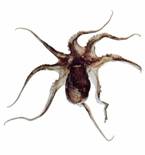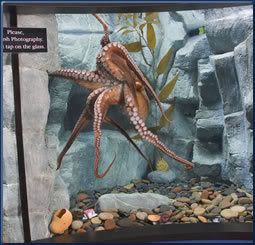Pulpos en un acuario -An octopus in the home aquarium-
Published Wednesday, October 11, 2006 by Spyder | E-mail this post Si está planteándose ponerse un acuario en su casa con algunos peces, tal vez sea hora de plantearse una nueva posibilidad menos común, pero puede que más atractiva. ¿Qué le parecería tener un pulpo en un acuario casero?
Si está planteándose ponerse un acuario en su casa con algunos peces, tal vez sea hora de plantearse una nueva posibilidad menos común, pero puede que más atractiva. ¿Qué le parecería tener un pulpo en un acuario casero? El siguiente artículo reflexiona sobre este tipo de acuarios.
Don't Fear the Raptor - An Octopus in the Home Aquarium
Are you ready to keep a new pet: something different, challenging, intelligent, and cunning? A creature that has entirely too many plural noun names: octopuses, octopi, octopods, octopoids, octopodes, octopussies (Lane)—and you thought ozone kinetics was confusing! A creature that has a reputation and a place in folk lore. Octopuses, or devil fish, have battled at least a few epic heroes to the death and have allegedly attacked and sank ships in order to dine on sailors. Whether in fiction or fact, octopuses are amazing creatures; and with preparation and knowledge, they can be successfully maintained in a home aquarium.
Octopuses are classified in the phylum Mollusca which includes gastropods (snails, nudibranchs, etc.), polyplacophorans (chitons), bivalves (clams, oysters, and mussels), scaphopods (tusk shells), and some others. Octopuses are placed in the class Cephalopoda which translates as 'head-foot.' This most advanced molluskan class also includes nautili, cuttlefish, and squid. Of all invertebrates which compose over 95 per cent of the Animal Kingdom, octopuses may be the most intelligent.
 Some of the octopus's remarkable abilities include the capability to expel ink and to change skin texture and apparent size. They are able to jettison water through their siphon by contracting their mantel to provide quick thrust. They have well developed eyes and an efficient closed circulatory system. Octopuses have surprisingly strong but sensitive suckers on their eight arms. Some octopuses make 'speculative attacks' on rocks hoping to flush out prey that might be hiding beneath. Others use their bodies as cast nets and 'parachute' onto prey to trap them. There are reports of octopuses dropping rocks in between the open shells of bivalves, preventing the shell from closing and enabling an easy kill (Lane).
Some of the octopus's remarkable abilities include the capability to expel ink and to change skin texture and apparent size. They are able to jettison water through their siphon by contracting their mantel to provide quick thrust. They have well developed eyes and an efficient closed circulatory system. Octopuses have surprisingly strong but sensitive suckers on their eight arms. Some octopuses make 'speculative attacks' on rocks hoping to flush out prey that might be hiding beneath. Others use their bodies as cast nets and 'parachute' onto prey to trap them. There are reports of octopuses dropping rocks in between the open shells of bivalves, preventing the shell from closing and enabling an easy kill (Lane). Octopuses can adapt to new situations and solve problems; they appear to be curious about their surroundings ('hmmm, I wonder if I could get out of this tank' or 'hmmm, where does that tube go?') They have the intelligence and ability to get into and out of fishermen's crab and fish traps, and certainly to get beneath an undergravel filter plate. Octopuses have very little hard material in their bodies, only a beak and a radula in most, enabling them to squeeze into or through amazingly small spaces. (...)
El artículo completo está en The Cephalopod Page
Labels: Comportamiento



0 Responses to “Pulpos en un acuario -An octopus in the home aquarium-”
Leave a Reply